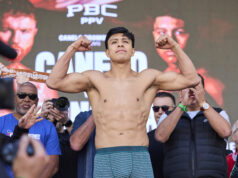Boxing attempts to become more than just Olympic history in London during the next couple of weeks in a fight to reclaim an identity that just hasn’t been the same since the Seoul scandal in 1988.
Muhammad Ali, a 1960 gold medalist, is in London like royalty. He is attached to the Olympics like a sixth ring, a ceremonial symbol of what they were and boxing was. But Roy Jones Jr. is the current symbol of what the Olympics have become for a sport that has fallen off the marquee and into the margins in the 24 years since gold was stolen from the former pound-for-pound king.
In a story for the August edition of The Ring, Jones confirmed what I have always believed. To
wit: Boxing’s long decline – in the Olympics and pros – began on that infamous afternoon in Seoul when judges robbed him of light-middleweight gold with a decision unequalled in outrage.
It happened before the internet and long before the immediate anger at Timothy Bradley’s split decision over Manny Pacquiao in June. Imagine if twitter had been around when Jones was left with silver and judges were suspected to have collected some.
The tweets, digital graffiti, might have been enough for Olympic officialdom to finally banish a sport it has never much liked anyway. As it was, the ringside corruption, confirmed in the subsequent disclosure of East Germany’s secret-police files, was enough to push boxing into a medal sport seemingly on perpetual probation. Squeamish officials tolerate it, mostly because they have to. Even the poorest nations in the third world can send a boxer to London. But countries without swimming pools can’t compete with Michael Phelps.
With boxing shoved out of the Olympic limelight and away from the NBC cameras, however, the pro ranks were robbed of a significant step in development and marketing.
“At the time, I didn’t really realize what had happened,’’ Jones told me in an interview for The Ring. “What I didn’t realize was how much it hurt boxing. The reason I say that is because, truthfully, the Olympics was where boxing kind of gets a little jump start.’’
http://ringtv.craveonline.com/images/toc/ring_aug12_contents.pdf
That jump start is gone, Jones says, because of 1988 and the subsequent move to computerized scoring. There’s no way to correct what happened in Seoul. But there are lessons. An intriguing step will come after London when computerized scoring will end. At the 2016 Games in Rio de Janeiro, boxing will go back to traditional scorecards instead of computer operators who act as judges by punching a button as way to count the punches they see land.
Jones welcomes the move, although it reopens the possibility of the 1988 scoring in one of the greatest scandals in Olympic history. Nevertheless, it’s a step that Jones says will regenerate Olympic interest in amateurs who have a chance at pro careers.
There’s also been talk about bringing pros into the Olympics. Who knows, maybe, Floyd Mayweather Jr., can turn the bronze he won in 1996 into gold in 2016?
However, George Foreman, a 1968 gold medalist at the Mexico City Games, doesn’t like the prospect of pros at the Olympics.
“The Olympics have always been a chance for a nobody to become somebody,’’ said Foreman, a former heavyweight champ who is The Ring’s super-heavyweight on a Dream Team, an all-time American Olympic roster. “For me, other things were probable. But the gold medal? It was impossible. For me, that was the beginning.’’
Foreman is convinced that, in time, boxing will find the young fighter who will resurrect an Olympic sport known for him, Sugar Ray Leonard, Oscar De La Hoya, Floyd Patterson, Jones, Andre Ward and a light-heavyweight named Cassius Clay, now known simply as Ali.
“We don’t even know who he is yet,’’ Foreman said. “But he’s out there. Look at what Michael Phelps has done for swimming. More than 30 years after Mark Spitz, he turned it in the sport people want to see. It only takes one person. Nothing is wrong with Olympic boxing.’’
Nothing but a comeback.
Notes, Anecdotes
· Trainer Freddie Roach, already busy training Julio Cesar Chavez Jr. for his Sept.15 middleweight clash with Sergio Martinez at Las Vegas Thomas & Mack Center, has no plans to be in London for Olympic boxing. He worked with some of the American s as a consultant to the U.S. team. But that was before a late shuffle in the U.S. coaching staff.
· Golden Boy Promotions CEO Richard Schaefer is already in London. If he can sign some of the best prospects, he hopes to introduce them to the pro ranks on an Oct. 14 card, a Sunday, at Las Vegas’ Mandalay Bay. On Oct. 13, Schaefer has plans for a card that might include junior-featherweight champion Abner Mares, also at Mandalay.
· Just wondering: Could NBC’s renewed deal for pro boxing lead to more network coverage of Olympic boxing? After years of seeing more ribbon-waving girls in rhythmic gymnastics than boxers, any boxing coverage at all would be a lot.






